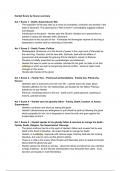Hamlet Scene by Scene summary
Act 1 Scene 1 - Death, Supernatural, War
- The exposition of the play sets up a mood of uncertainty, confusion and anxiety in the
state of Denmark. The opening line (“Who’s there?”) immediately suggests mistrust
and disquiet.
- Introduction to the ghost - Horatio sees the Ghost’s visitation as a premonition or
portent of chaos and disorder within Denmark.
- Introduction to the sub-plot of war - Fortinbras the Norwegian nephew of the King is
desperate to reclaim land by marching on Denmark
Act 1 Scene 2 - Death, Power, Politics
- Shakespeare introduces us to the forces of power in the royal court of Denmark as
the new King, Claudius, and his new wife, Gertrude, deal with the affairs of
government and persuade the grieving Prince Hamlet to remain in Elsinore.
- Claudius is initially presented as a peacekeeper and statesman
- Hamlet first seen in public as an outsider criticised for his grief, but later in his first
soliloquy in which we see his burgeoning internal conflict - series of rapid mood
changes in this scene
- Horatio tells Hamlet of the ghost
Act 1 Scene 3 – Family Ties – Polonius/Laertes/Ophelia - Family ties, Patriarchy,
Honour
- Ophelia’s lack of autonomy over her own life - Laertes warns his sister about
Hamlet's affection for her, her relationships are decided by her father, Polonius
forbids her to see Hamlet
- Polonius’ moralising advice to his son - partly comic, partly genuine, speaking in
truisms, parental anxiety
Act 1 Scene 4 – Hamlet sees his ghostly father - Family, Death, Inaction vs Action,
Supernatural
- Hamlet’s confusion and shock at seeing the ghost
- Hamlet’s decisiveness and willingness to put himself at peril by following the ghost
elicits sympathy for him, he is desperate to know the truth and goes against his
trusted allies to find it.
Act 1 Scene 5 – Hamlet speaks to his ghostly father & resolves to avenge his death -
Family, Death, Religion, the Supernatural, Revenge
- The ghost confirms that he is the spirit of Hamlet's father and reveals that he was
killed at the hand of Claudius. He orders Hamlet to avenge his death.
- Hamlet, in a soliloquy, responds with intense anger, blaming Getrude and cursing
Claudius, but vows to carry out the ghost’s wishes.
- There is a volta in the scene when Horatio and Marcellus arrive to speak to Hamlet
about what the ghost has said
- Hamlet swears his friends to secrecy - about the Ghost and about his own intention
to feign madness - as the Ghost's disembodied voice demands their oaths - trust,
devotion and loyalty in male friendships
, Act 2 Scene 1 – Polonius spies on Laertes. Ophelia is perturbed by Hamlet’s
dishevelment - Power, Deceit and Women
- Polonius asks Reynaldo to spy on Laertes in France
- Ophelia reports that Hamlet has come to her and behaved as if he were insane.
Polonius concludes that his separation of Ophelia and Hamlet has driven the prince
mad with love-sickness, and he decides to inform the King of this.
Act 2, Scene 2 - deceit, action vs inaction, death, play within a play, male friendship,
madness, self-analysis and self-criticism
- Claudius orders Rosencrantz and Guildenstern, fellow students of Hamlet, to spy on
their friend.
- Polonius declares that Hamlet is lovesick, producing a love letter from the prince that
he has confiscated from Ophelia. He suggests eavesdropping on an encounter
between Ophelia and Hamlet.
- Polonius approaches Hamlet alone. Hamlet answers him with nonsensical remarks
and absurd insults.
- Hamlet greets R+G and badgers them into admitting that they have been sent to
observe him.
- Players from the city arrive, and Hamlet welcomes them enthusiastically (change in
mood again), asking the First Player to recite a dramatic monologue describing an
episode of revenge from the Trojan War. Hamlet requests that the Players perform
‘The Murder of Gonzago’ before the court that night, inserting lines that he will
compose.
- Hamlet soliloquizes on his delay in avenging the Ghost. He suspects that the spirit
may have lied; he will have the Players enact a killing similar to his father's murder,
and if Claudius responds guiltily, he will know that the Ghost has spoken the truth.
Act 3, Scene 1 - surveillance, madness, gender/patriarchy, deceit
- Polonius instructs Ophelia to meet Hamlet while he and Claudius eavesdrop.
- Hamlet meditates on the value of life in the face of death, the potential merits of
suicide, and the fear of eternal damnation, in his ‘to be or not to be’ soliloquy, while
P+C overhear?
- Ophelia greets Hamlet and he passionately rejects her with a wild diatribe (a forceful
and bitter verbal attack/tirade) against women. He leaves her grieving for his
apparent madness.
- The King dismisses Hamlet’s love-sickness and decides to send him to England.
Polonius suggests further surveillance in the meantime.
Act 3, Scene 2 - volta in play, meta-theatricality,
- Hamlet lectures the Players on acting.
- The court assembles publically, and the Players perform an introductory Dumb Show,
in which a murderer kills a king by pouring poison in his ear as he sleeps. The Player
King and Player Queen then speak; she asserts that she will never remarry if he dies,
but he insists that she will. He then rests, falling asleep. Another Player, in the part of
Lucianus, pours a potion in the ear of the Player King.
- As his guilt is revealed, the real King rises and leaves in distress. Hamlet exults in the
success of his plan. Rosencrantz and Guildenstern, and then Polonius, deliver the




